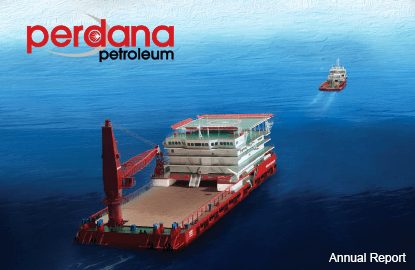
This article first appeared in The Edge Malaysia Weekly, on December 21 - 27, 2015.
IN mid-May this year, Dayang Enterprise Holdings Bhd announced a mandatory general offer (MGO) for Perdana Petroleum Bhd at RM1.55 per share and offered 84 sen per warrant after it had bought a 5.74% block from Affin-Hwang Asset Management Bhd. The acquisition nudged the oil and gas group’s stake to 35.51% — above the 33.33% threshold for an MGO.
The oil and gas group’s MGO saw overwhelming acceptance mainly because crude oil prices were tanking and Perdana’s shareholders seized the opportunity to exit. Currently, Dayang holds 763.01 million shares or 98.01% of Perdana’s shares.
The entire share purchase cost Dayang RM837.25 million — not a small sum. With hindsight, if Dayang had made the offer three months later — when there was a rout on global equity markets and oil and gas stocks were prime targets — the valuation of Perdana’s shares would have been very different.
Trading in Perdana’s shares has been suspended since end-September due to the narrow public spread. The suspension will only be lifted when the 25% public shareholding spread requirement is met.
In mid-November, Dayang applied for a six-month extension to comply with the shareholding spread but the stock exchange only granted it three months from Nov 13 to Feb 12.
Is this what Dayang wanted when it bought the shares from Affin-Hwang Asset Management?
Its plan was not to take Perdana private. In an announcement to Bursa Malaysia, the oil and gas group said it “will explore various options or proposals to restore the public shareholding spread of Perdana or procure Perdana to explore all possible options to restore the public shareholding spread”.
Dayang has said the synergy between the two companies was part of its “expansion strategy and long-term objective of evolving into a market leader in the provision of hook-up construction and commissioning services in the oil and gas industry”.
Perdana’s shares were last traded at RM1.54, and analysts opine that if not for the MGO, the stock price would have tumbled to multi-year lows like the others.
Before the suspension, Perdana’s stock price had climbed more than 35% since the start of the year. In stark contrast, its two competitors — Alam Maritim Resources Bhd and Icon Offshore Bhd — have seen their shares plunge almost 35% and 48% respectively year to date.
To meet the minimum public spread requirement, Dayang could undertake a placement to reduce its holding but it is unlikely that the company can get RM1.55 a share, not in these market conditions.
So, why didn’t Dayang’s board take into consideration that any downside to crude oil prices would dictate the valuation of oil and gas assets?
Its management is experienced with its executive deputy chairman Datuk Ling Suk Kiong having been in the oil and gas business for more than 30 years, according to the company’s annual report.
Dayang spent RM837.25 million mopping up the 540.16 million shares it didn’t own in Perdana.
Some quarters point out that it might be better for Dayang to take the purchase of assets and liabilities route.
Perdana currently has five work barges and a work boat deployed to Dayang on long-term charters. It has a total fleet of 17 vessels — eight anchor handling tugs, seven work barges and two work boats with an additional two work barges under construction at a cost of RM270 million.

In the current oil and gas downturn, Dayang could have acquired assets cheap. In Perdana’s announcement of its financial results, it says its vessel utilisation rate was 55% in its third quarter, down from 98% in the previous corresponding period.
Like many other oil and gas companies, Perdana’s earnings have been hit.
For its nine months ended Sept 30, the company suffered a net loss of RM38.74 million on revenue of RM179.59 million. In the previous corresponding period, it had registered a net profit of RM73.04 million from RM269.67 million in sales.
As at Sept 30, Perdana had a cash balance of RM31.21 million, long-term borrowings of RM537.25 million and short-term debt commitments of RM212.86 million. Its finance cost for the nine months was RM24.43 million.
Dayang, meanwhile, posted a net profit of RM152.7 million on revenue of RM556.90 million in its nine months ended Sept 30. It recognised a gain of RM82.1 million as a result of a re-measurement of its equity interest in Perdana to fair value as at July 1.
In its financial results, Dayang says Perdana contributed a loss of about RM23.4 million in the current quarter primarily due to lower vessel utilisation.
At RM1.55 per share, Perdana was valued at a price-to-book ratio of 1.74 times based on its audited net assets as at Dec 31, 2014, and price-to-earnings of nearly 13 times on net profit achieved in the financial year ended Dec 31, 2014.
With crude oil prices having hit a seven-year low now, Perdana’s shareholders are likely grateful for the MGO from Dayang. However, this may not be the case for Dayang’s shareholders.
Save by subscribing to us for your print and/or digital copy.
P/S: The Edge is also available on Apple's AppStore and Androids' Google Play.